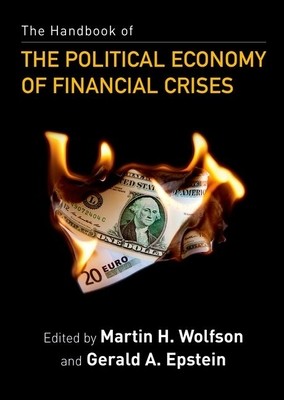
- We will send in 10–14 business days.
- Publisher: Oxford University Press, USA
- ISBN-10: 0190240938
- ISBN-13: 9780190240936
- Format: 17 x 24.4 x 4.3 cm, softcover
- Language: English
- SAVE -10% with code: EXTRA
The Handbook of the Political Economy of Financial Crises (e-book) (used book) | bookbook.eu
Reviews
Description
The Great Financial Crisis that began in 2007 reminds us with devastating force that financial instability and crises are endemic to capitalist economies, and that it is only strong and dynamically-changing financial regulations that can keep the damage caused by these crises within bounds. The international financial system and individual national economies, including that of the United States, are suffering from the aftermath of the worst financial crisis since the Great Depression. Economists are struggling to understand the origins and implications of the crisis. The Handbook of the Political Economy of Financial Crises uses a political economy theoretical framework to analyze the crisis.
After an opening chapter that describes the dimensions of the current crisis, the next section provides relevant theoretical frameworks. Subsequent sections apply these theoretical frameworks to analyze the background, dimensions, and implications of the crisis for the world economy. Leading scholars push forward our understanding of how and why our international and domestic economies are susceptible to financial breakdown and what can be done to mitigate this problem in the future. The methodology throughout applies theoretical concepts in the context of an historical and institutional understanding of the real world. By emphasizing the historical and institutional aspects of financial crises, the authors advance economic knowledge and provide insights into how we can manage our financial system to improve the lives of ordinary people.EXTRA 10 % discount with code: EXTRA
The promotion ends in 16d.22:22:42
The discount code is valid when purchasing from 10 €. Discounts do not stack.
- Publisher: Oxford University Press, USA
- ISBN-10: 0190240938
- ISBN-13: 9780190240936
- Format: 17 x 24.4 x 4.3 cm, softcover
- Language: English English
The Great Financial Crisis that began in 2007 reminds us with devastating force that financial instability and crises are endemic to capitalist economies, and that it is only strong and dynamically-changing financial regulations that can keep the damage caused by these crises within bounds. The international financial system and individual national economies, including that of the United States, are suffering from the aftermath of the worst financial crisis since the Great Depression. Economists are struggling to understand the origins and implications of the crisis. The Handbook of the Political Economy of Financial Crises uses a political economy theoretical framework to analyze the crisis.
After an opening chapter that describes the dimensions of the current crisis, the next section provides relevant theoretical frameworks. Subsequent sections apply these theoretical frameworks to analyze the background, dimensions, and implications of the crisis for the world economy. Leading scholars push forward our understanding of how and why our international and domestic economies are susceptible to financial breakdown and what can be done to mitigate this problem in the future. The methodology throughout applies theoretical concepts in the context of an historical and institutional understanding of the real world. By emphasizing the historical and institutional aspects of financial crises, the authors advance economic knowledge and provide insights into how we can manage our financial system to improve the lives of ordinary people.

Reviews